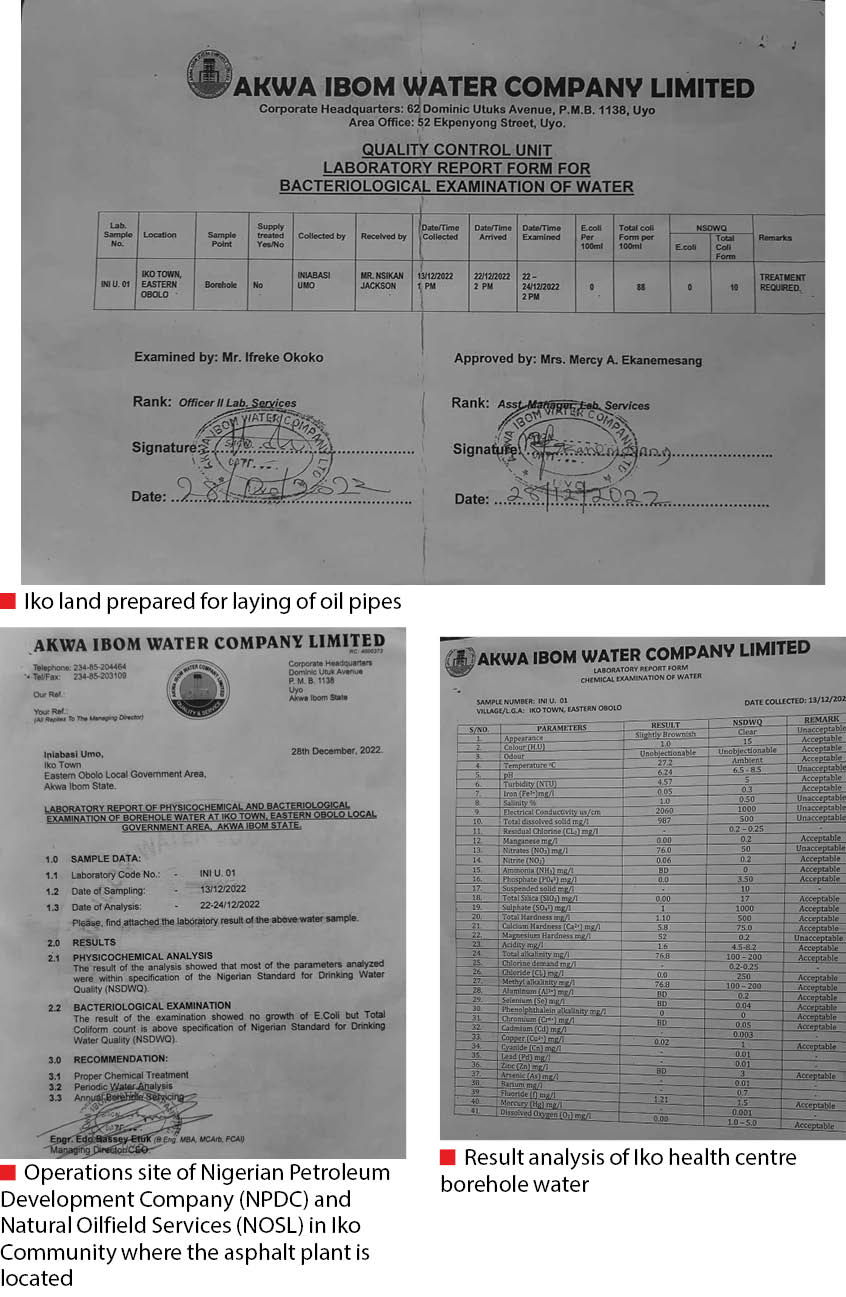For a long period of time, the indigenes of Iko town, Eastern Obolo Local Government, Akwa ibom state, have had to live with the devastating effects that come with oil exploration, which has led to loss of lives and left the community inhabitable. Daily Trust Saturday reports.
The people of Iko Town in eastern Obolo Local Government Area of Akwa Ibom State are lamenting the devastating effect of many years of oil exploration to their community. They told Daily Trust Saturday that oil spill has so polluted the area that their water has become poisonous and no longer safe for drinking, in addition to destruction of economic activities and livelihood of the coastal community, which borders the Atlantic Ocean.
Findings from the community revealed that when collected in a container and kept for days, their water changes colour, which makes it unfit for drinking and cooking. It was also said that rain water is the worst as it does not only turn black but discolours the container in which it is collected.
The unhealthy state of water in Iko is in sync with United Nations Children’s Fund (UNICEF) 2022 report that one third of Nigerians drank contaminated water, and 70 per cent of water, at the point of consumption, was contaminated.
Watching the watchdog: Newspapers get Ombudsman
Watching the watchdog: Newspapers get Ombudsman
This report negates the United Nations Sustainable Development Goal 6 target to ensure availability and sustainable management of water and sanitation for all by 2030.
In fact, after Shell left Iko community after over 20 years of plaguing the area and turning the once fertile environment to a waste land, a new oil exploration company, Nigerian Petroleum Development Company (NPDC) and Natural Oilfield Services (NOSL) Ltd took over the job and have operated in the area for four years.
Their operations have further contaminated the water in the community, such that the people cannot even rely on rainwater as an alternative as it is said to be covered in soothe owing to asphalt operations run by the company.
The vice principal of Community Secondary School, Iko Town, Elder Daniel Noah, explained that asphalt burnt by the company to make tar was always released as smoke, which goes into the atmosphere, mixes with moisture and falls back as rain.
“It is unfortunate that in our community, which does not have potable water, rainwater is also very dark and smoky, such that it can even paint your container.
“The water is very bad, but sometimes people don’t have an option, so they keep it to see if it would settle. Sometimes the asphalt (dark substance) would settle on the water and you would just clear it and drink,” he said.
Noah, an indigene of the community, who is in his late 40s, said that before the company started operation in the area, rainwater was good for drinking. He added that the community had no alternative source of water like a stream or river.
Mr Ofonime David, another teacher who has lived in the community for 10 years, said he drank sachet water and only used their water for bathing, after disinfecting it.
“We dig the ground and water will start coming out, then we use cement to construct a well. That is the water we use to wash cloths and bathe. Since I came here, I have been drinking sachet water. The water is not good for drinking. I use Dettol on the water before I use it to bathe.
“Sometimes there is oil on the water, and I believe it has an effect on the body. But we don’t drink the water because mere seeing it you would know you cannot drink it,” he said.
Residents of the community told Daily Trust Saturday that the contaminated water has had adverse effects on their health as some children who use it to bathe suffer from rashes.
Narrating the effect of drinking the water on his family and the community, Noah said two of his children, alongside others, died between March and April 2022.
He lamented, “We have been having serious health challenges in my family. Between March and April, I had to bury two of my children. They died in a space of one week. They were purging before they died.
“I took them to Immanuel Hospital, Eket, where they ran some tests, but before I got the results, they died, so I didn’t bother about it again. One was two and a half years while the other was one year old.
“That period, other children also died. After that, we had a serious outbreak of measles in the community. Most of the babies were taken to the health centre. Some who could survive it did, but some died, even after taking vaccines.”
The story of Noah supports the 2022 UNICEF report that poor access to improved water and sanitation in Nigeria is a major contributing factor to high morbidity and mortality rates among children under five. It synchronises with the agency’s report that the use of contaminated water and poor sanitary conditions result in increased vulnerability to water-borne diseases, including diarrhoea, leading to deaths of more than 70,000 children under five annually.
Confirming the health challenges posed by the contaminated water, the officer-in-charge (OIC) of Iko Town Health Centre, Mrs Doris Unyonga, confirmed that water in the community was not good for drinking.
She said that many patients, especially company workers who are not used to the water, usually go to the facility with complaints of reaction to the water. She mentioned that they have had cases of diarrhoea, rashes and skin burn owing to the use of the water.
“Many people, especially company workers who are not from this community, come here with complaints.
“We have had many cases of diarrhoea, skin rashes and skin burns from persons who have either drank the water or bathed with it. But we have not had any case of death caused by the water.
“Yes, between May and April, we had an outbreak of measles in this community and many children died. Some of the deaths recorded were because the people preferred to treat the sickness at home instead of coming to the health centre.
“We can attribute the measles outbreak to air pollution from the oil exploration activities going on,” she said.
A sample of water from a borehole at the Iko Town Health Centre for analysis at the Akwa Ibom Water Company Limited, Central Laboratory, Quality Control Unit in Uyo, showed, among other things, that the water fell short of the Nigerian Standard for Drinking Water Quality (NSDWQ).
The laboratory report of physicochemical examination of the borehole water as signed by the managing director and chief executive officer of Akwa Ibom Water Company Limited, Edo Bassey Etuk, an engineer, revealed that most of the parameters analysed were within the specification of the NSDWQ.
The bacteriological examination showed “no growth of E.Coli, but total Coliform count is above specification of the Nigerian Standard for Drinking Water Quality,” as such, the water was recommended for “proper chemical treatment, periodic water analysis and annual borehole servicing.”
The chemical examination of the water showed that it was slightly brownish and not acceptable, according to NSDWQ requirements, which should be clear. The pH parameter was 6.24 against NSDWQ requirement of 6.5-8.5; the salinity was 1.0 against the NSDWQ requirement of 0.50.
Electrical conductivity us/cm was 2060 against the NSDWQ requirement of 1,000; total dissolved solids mg/l was 987 against NSDWQ requirement of 500; nitrates (NO³)mg/l was 76.0 against the NSDWQ requirement of 50, while magnesium hardness mg/l was 52 against the NSDWQ requirement of 0.2. The results of these parameters were all unacceptable.
Commenting on the water analysis result, Dr Edesiri Ighorodje, consultant physician, University of Uyo Teaching Hospital (UUTH), said consumers of the water risked a myriad of diseases for both children and adults, such as depression, muscle weakness, heart and rhythm disorders, blood disorders, hypertension, increase risk of stomach, colon and bladder cancers, cholera and hepatitis, among others.
Ighorodje cautioned persons with medical conditions, such as heart and kidney diseases living in the community, to cautiously use the water, saying, “Consumption, in the long run may adversely affect their existing conditions, even with compliance to prescribed treatment by the doctor.”
While analysing the result, the consultant said the water was slightly more acidic, noting that the pH value of water “is essential for metabolism as it affects many of the chemical and biological processes in the body requiring enzymatic activations. Low pH will cause pitting of the water pipes and fixtures giving it a metallic taste.”
Speaking on the high salinity and electrical conductivity of the water, she explained that it was unhealthy for people suffering from kidney and heart diseases as it may cause laxative or constipation effects in consumers
“The level of salinity and total dissolved solids (TDS) is a reflection of the source of water. The water with high TDS value indicates that it is highly mineralised. In turn, TDS in water determines the electrical conductivity.
“Unacceptable levels of TDS, electrical conductivity and salinity in this water sample considerably alter its quality affecting persons who are suffering from kidney and heart diseases. Water containing high solid may cause laxative or constipation effects in consumers,” she stated.
Dr Ighorodje mentioned that the high concentration of toxic substances in the water posed a risk for blood disorders and hypertension, adding that low levels of elements like potassium could lead to depression, muscle weakness, heart and rhythm disorders among others.
“In addition, some toxic substances, such as atrazine, benzene, arsenic, barium, cadmium, chromium, lead, mercury, selenium, silver, and cyanides can exist as contaminants. High concentrations of these can be cardiotoxic, hepatotoxic, posing a risk for blood disorders and hypertension.
“The presence of elements in water is essential for proper functioning in humans but should exist in permissible ranges. Proper quantity of sodium in the human body prevents many fatal diseases like kidney damages, hypertension. In contrast, the deficiencies or low levels of elements, such as potassium, may result in depression, muscle weakness, heart rhythm disorders etc.
“These levels of these two elements (sodium, potassium) of medical importance were found not to be assessed in this water sample. Of note is that short and long-term water consumption of unacceptable levels of these chemical agents causes a wide range of abnormalities; short duration affects brain and nervous system causing dizziness, headaches, while long term exposure may increase risk of stomach, colon and bladder cancers,” she added.
The physician said the intake of large levels of nitrates in the water was disadvantageous to pregnant women and infants, adding that the manganese level was high and could result in bath itch.
Ighorodje commended the level of oxygen in the water, saying “It is a good indicator for ensuring the survival of the bodily systems,” but cautioned against the total coliform found in the water. He noted that it was an indication of high probability of other pathogenic bacteria, which is against World Health Organisation’s (WHO) requirement of its absence in public drinking water supplies.
She also mentioned that there were traces of fecal coliform, which can lead to outbreaks of diarrheal diseases, such as cholera and hepatitis.
To mitigate the effects of the water usage, the consultant called on the government to carry out regular water interventions in line with WHO guidelines, and counsel patients on the use of safe water.
The expert analysis is an indication that the use of borehole water in Iko community poses a danger to the health of the people if not periodically treated as recommended. But can the government or companies operating in Iko Town be trusted to save the people from future health crisis?
This report was sponsored by Daily Trust Foundation.

 Join Daily Trust WhatsApp Community For Quick Access To News and Happenings Around You.
Join Daily Trust WhatsApp Community For Quick Access To News and Happenings Around You.


